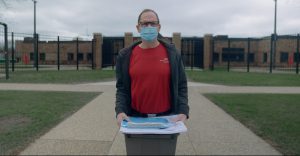School explores offering legal education for incarcerated people

Mitchell Hamline President and Dean Anthony Niedwiecki stands in front of the Shakopee (Minn.) Correctional Facility on Apr. 10, 2021, just before entering to administer an LSAT exam. It’s believed to be the first time the LSAT has been ever administered inside a prison in the U.S.
Mitchell Hamline President and Dean Anthony Niedwiecki has proctored many exams in his life but never behind bars. When he administered the LSAT in two Minnesota correctional facilities earlier this month (Apr. 10 and 11), it was believed to be the first time that has happened inside a prison in the United States.
Niedwiecki’s prison visits stemmed from his personal commitment to extending access to education as widely as possible, but it may be that the school will soon be involved as well in educating current residents in correctional facilities.
Two organizations – All Square and Until We Are All Free – along with the Minnesota Department of Corrections are collectively developing and raising money for a Prison-to-Law Pipeline program that would establish the first ABA-accredited juris doctorate and paralegal degree opportunities for inmates. The organizations are talking with Mitchell Hamline about providing the J.D. piece.
The idea would need to be further developed and approved by faculty as well as by the American Bar Association, but Niedwiecki says Mitchell Hamline’s expertise in providing remote education and its commitment to social justice make this project a great fit in concept.
“Our school is dedicated to access to a law school education for all,” said Niedwiecki, who proctored the exam at a women’s prison in Shakopee, Minn. and a maximum-security prison in Stillwater, Minn. “Our groundbreaking work in delivering these courses online allows us to expand this vision to potentially include those in prison.”
The project would extend a partnership Mitchell Hamline already has with All Square, a nonprofit social enterprise that invests in formerly incarcerated leaders through fellowships anchored in mental health, wealth, and entrepreneurship. Their work includes helping operate a grilled cheese restaurant.
Mitchell Hamline’s Reentry Clinic has worked with All Square to offer classes to formerly incarcerated fellows on matters like applying for expungement. “The idea of legal education inside prisons is a logical extension of the kind of work we’ve already been doing for former inmates,” said Jon Geffen, the clinic’s director.
“This is about education, which is what we do as a law school,” added Professor Brad Colbert, who also works with Mitchell Hamline’s LAMP clinic – Legal Assistance for Minnesota Prisoners. “Nobody is more impacted by the law than those incarcerated.”
“We’re excited to work with Mitchell Hamline to hopefully make this idea a reality,” said Kevin Reese, founder of Until We Are all Free.
“The legal discipline and community at large has already benefited from the expertise of formerly and currently incarcerated legal scholars who, without ABA-accredited law degrees, have founded companies, drafted legislation, taught at legal institutions, sat on state boards of public defense, drafted and filed legal petitions, led campaigns, and mentored others towards post-conviction relief,” said Emily Hunt Turner, CEO of All Square.
“The Prison-to-Law Pipeline will build on this expertise by formalizing accredited pathways to legal education because of one’s experience with incarceration, recognizing that the yield of legal practitioners with lived experience is an essential element of a fully representative legal discipline and a step towards healing the effects of flawed and racialized legal processes.”
“We’ve talked about being an antiracist law school, and our faculty passed a resolution committing to being an antiracist law school,” said Dean Niedwiecki. “This project would be an actual step towards being an antiracist law school.”
